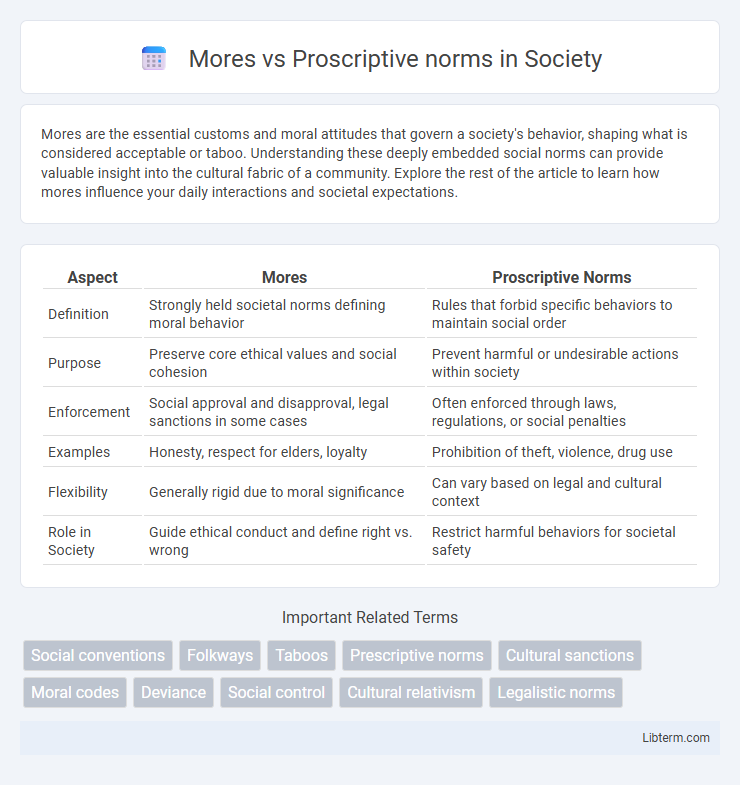Mores are the essential customs and moral attitudes that govern a society's behavior, shaping what is considered acceptable or taboo. Understanding these deeply embedded social norms can provide valuable insight into the cultural fabric of a community. Explore the rest of the article to learn how mores influence your daily interactions and societal expectations.
Table of Comparison
| Aspect | Mores | Proscriptive Norms |
|---|---|---|
| Definition | Strongly held societal norms defining moral behavior | Rules that forbid specific behaviors to maintain social order |
| Purpose | Preserve core ethical values and social cohesion | Prevent harmful or undesirable actions within society |
| Enforcement | Social approval and disapproval, legal sanctions in some cases | Often enforced through laws, regulations, or social penalties |
| Examples | Honesty, respect for elders, loyalty | Prohibition of theft, violence, drug use |
| Flexibility | Generally rigid due to moral significance | Can vary based on legal and cultural context |
| Role in Society | Guide ethical conduct and define right vs. wrong | Restrict harmful behaviors for societal safety |
Understanding Mores: The Foundation of Societal Values
Mores represent the essential moral customs and core values that shape societal behavior and distinguish right from wrong within a community. They are deeply ingrained norms that maintain social order by promoting collective welfare and defining ethical standards. Understanding mores provides insight into the foundational principles that guide social cohesion and cultural identity.
Defining Proscriptive Norms in Social Contexts
Proscriptive norms are social rules that explicitly prohibit certain behaviors to maintain order and cohesion within a group. These norms serve as critical guidelines, preventing actions deemed harmful or unacceptable, such as theft or lying. Understanding proscriptive norms is essential for studying social control mechanisms and the enforcement of cultural values.
Key Differences Between Mores and Proscriptive Norms
Mores are deeply held cultural norms that govern moral behavior and are essential for the functioning of society, often supported by strong sanctions for violations. Proscriptive norms specifically dictate behaviors that individuals must avoid, serving as explicit prohibitions within a culture. The key difference lies in mores encompassing broad moral expectations, while proscriptive norms strictly forbid particular actions, highlighting varying degrees of social control and enforcement.
Historical Evolution of Mores and Proscriptive Norms
Mores originated from early societal agreements rooted in morality and social order, evolving through cultural, religious, and legal transformations that defined acceptable behavior over centuries. Proscriptive norms, distinct yet intertwined, emerged historically as explicit prohibitions enforcing social control and mitigating taboos, often codified in laws and customary practices. The historical evolution of both reflects shifting societal values and power dynamics influencing conformity and deviance management.
The Role of Mores in Shaping Group Identity
Mores serve as powerful cultural norms that define the moral fabric and core values of a group, reinforcing social cohesion and collective identity through shared expectations of behavior. They distinguish acceptable conduct from taboo, shaping group identity by embedding deeply held beliefs that influence members' interactions and social roles. The enforcement of mores fosters unity and a sense of belonging, ensuring the preservation of cultural heritage within the group.
Proscriptive Norms: Controlling Unacceptable Behaviors
Proscriptive norms dictate behaviors that society explicitly forbids to maintain social order and prevent harm. These norms often address taboo actions such as theft, violence, or dishonesty, reinforcing community values through sanctions and social disapproval. By controlling unacceptable behaviors, proscriptive norms play a crucial role in preserving ethical standards and ensuring societal cohesion.
Cultural Variations in Mores and Proscriptive Norms
Cultural variations in mores and proscriptive norms significantly influence social behavior, with mores representing deeply held moral beliefs that vary widely across societies, such as dietary restrictions in Hindu culture or modesty norms in conservative Middle Eastern communities. Proscriptive norms dictate forbidden actions and differ culturally, exemplified by prohibitions against alcohol in Islamic countries compared to its social acceptance in Western cultures. Understanding these cultural distinctions is crucial for navigating social expectations and avoiding conflicts in multicultural settings.
Consequences of Violating Mores vs Proscriptive Norms
Violating mores typically results in severe social sanction, including ostracism, legal penalties, or moral condemnation, reflecting their foundation in core societal values. In contrast, breaking proscriptive norms, which dictate prohibited behaviors, often leads to milder consequences such as social disapproval or informal reprimands rather than formal punishment. The differential consequences emphasize the role of mores in maintaining social order and the more flexible, context-dependent nature of proscriptive norms.
Mores and Proscriptive Norms in Contemporary Society
Mores in contemporary society represent deeply held cultural values that dictate moral behavior and social expectations, ensuring cohesion through shared beliefs. Proscriptive norms function as explicit prohibitions against actions deemed harmful or unacceptable, reinforcing social order by discouraging behaviors like theft or violence. The interplay of mores and proscriptive norms shapes individual conduct and collective ethics, maintaining societal stability while adapting to evolving cultural contexts.
The Future of Social Norms: Adapting Mores and Proscriptions
Mores represent deeply held moral beliefs that dictate serious societal expectations, while proscriptive norms explicitly forbid certain behaviors to maintain social order. The future of social norms involves adapting these mores and proscriptions to evolving cultural values and technological advancements, ensuring relevance in diverse and dynamic communities. Emerging trends suggest a shift towards flexible frameworks that balance tradition with inclusivity and innovation.
Mores Infographic

 libterm.com
libterm.com